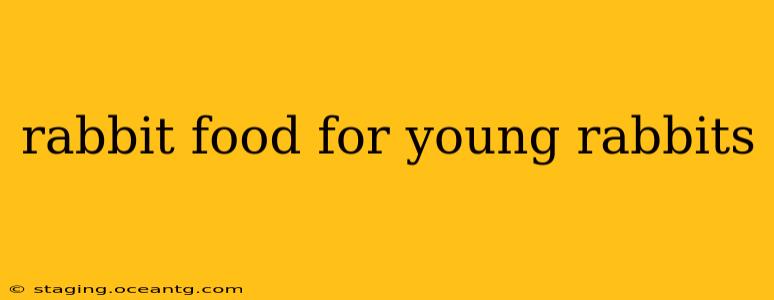Raising young rabbits, also known as kits, requires careful attention to their dietary needs. Providing the right nutrition during this crucial growth period is essential for their health and development. This comprehensive guide will delve into the best foods for young rabbits, addressing common concerns and misconceptions.
What Should I Feed My Baby Rabbit?
The most important thing to remember is that baby rabbits should not be weaned onto adult rabbit food immediately. Their digestive systems are still developing and require a different nutritional profile. For the first few weeks of life, kits rely entirely on their mother's milk. Once they start exploring solid food (typically around 3-4 weeks old), a gradual transition is necessary.
What Foods Are Suitable for Young Rabbits?
The transition should begin with high-quality timothy hay. This is the cornerstone of a rabbit's diet, regardless of age, providing essential fiber for healthy digestion. However, for young kits, you might need to offer softer, more palatable hay like orchard grass or oat hay initially.
Along with hay, introduce small amounts of rabbit pellets specifically formulated for young rabbits. These pellets are higher in protein and calories than adult pellets, supporting their rapid growth. Always choose a pellet that is made of high-quality ingredients and doesn't contain added sugars or artificial colors.
Can I Give My Baby Rabbit Vegetables and Fruits?
Yes, but with caution and moderation. Vegetables and fruits should only be introduced gradually, in very small quantities, and after the kit is eating hay and pellets comfortably. Suitable options include:
- Dark leafy greens: Small amounts of spinach, kale, romaine lettuce (in moderation), and parsley.
- Other vegetables: Shredded carrots, small pieces of bell pepper, and cucumber.
Fruits should be offered even more sparingly, as they are high in sugar. A tiny piece of apple or banana occasionally is acceptable, but should never replace hay and pellets as the main components of their diet.
Remember to always introduce new foods one at a time to monitor for any digestive upset.
What Should I Avoid Feeding My Baby Rabbit?
Several foods are toxic or harmful to rabbits, and should be completely avoided:
- Alfalfa hay: While good for adult rabbits, alfalfa hay is too high in calcium and protein for growing kits, potentially leading to skeletal problems.
- Treats: Avoid sugary treats, chocolate, bread, and processed foods. These are nutritionally empty and can cause serious health issues.
- Meat and dairy: Rabbits are herbivores; meat and dairy products have no place in their diet.
- Certain vegetables and fruits: Avoid large quantities of high-sugar fruits and vegetables like iceberg lettuce, potatoes, and onions.
How Much Should I Feed My Baby Rabbit?
The amount of food will vary depending on the rabbit's age, size, and breed. However, a good rule of thumb is to offer unlimited access to high-quality timothy hay. Pellets should be given in limited quantities, typically a small handful (1/4 cup to 1/2 cup) per day for a young rabbit, adjusting based on their size and growth. Vegetables and fruits should only be given as small treats.
Always ensure fresh water is available at all times.
When Can I Switch My Rabbit to Adult Rabbit Food?
You can gradually transition your rabbit to adult rabbit food around 4-6 months of age. This involves slowly decreasing the amount of young rabbit pellets and increasing the proportion of adult pellets, while continuing to provide unlimited timothy hay.
What are the Signs of Malnutrition in a Young Rabbit?
Signs of malnutrition in a young rabbit can include slow growth, dull coat, lethargy, and diarrhea. If you notice any of these symptoms, consult a veterinarian immediately.
By following this guide and paying close attention to your young rabbit's individual needs, you can help them grow into healthy and happy adults. Remember, a balanced diet is crucial for their well-being!
